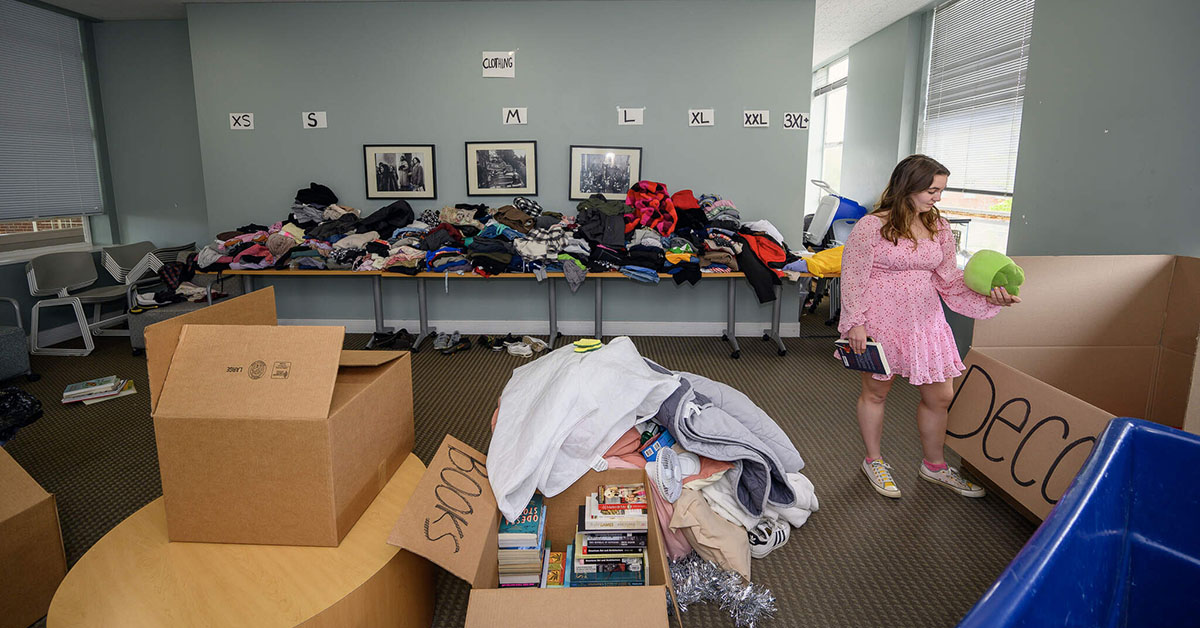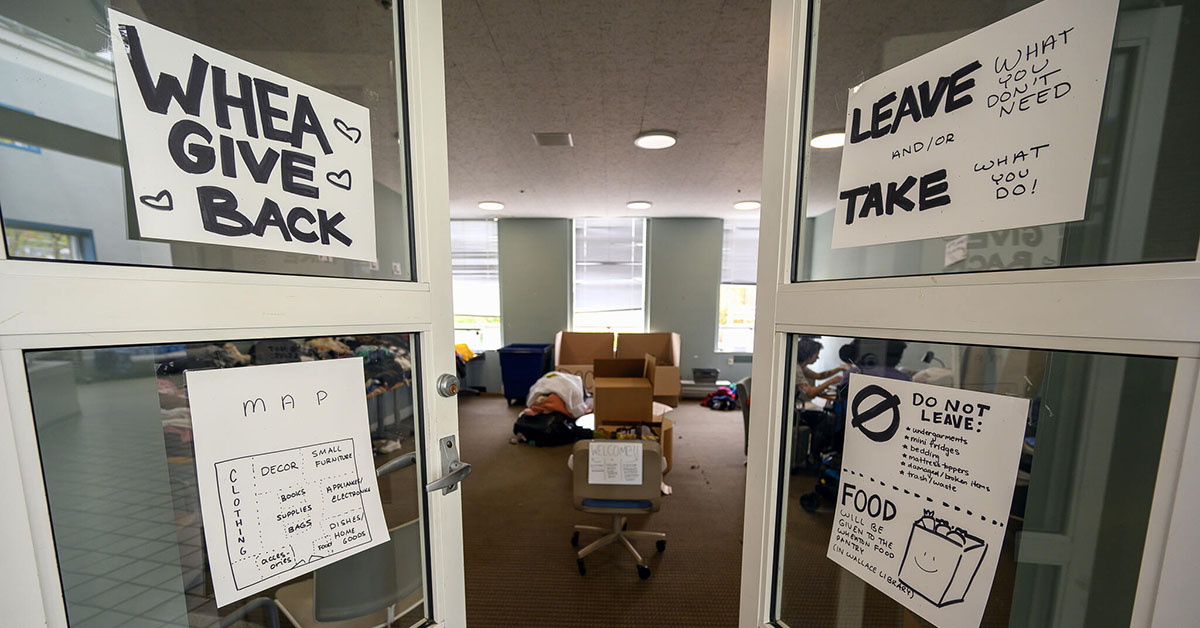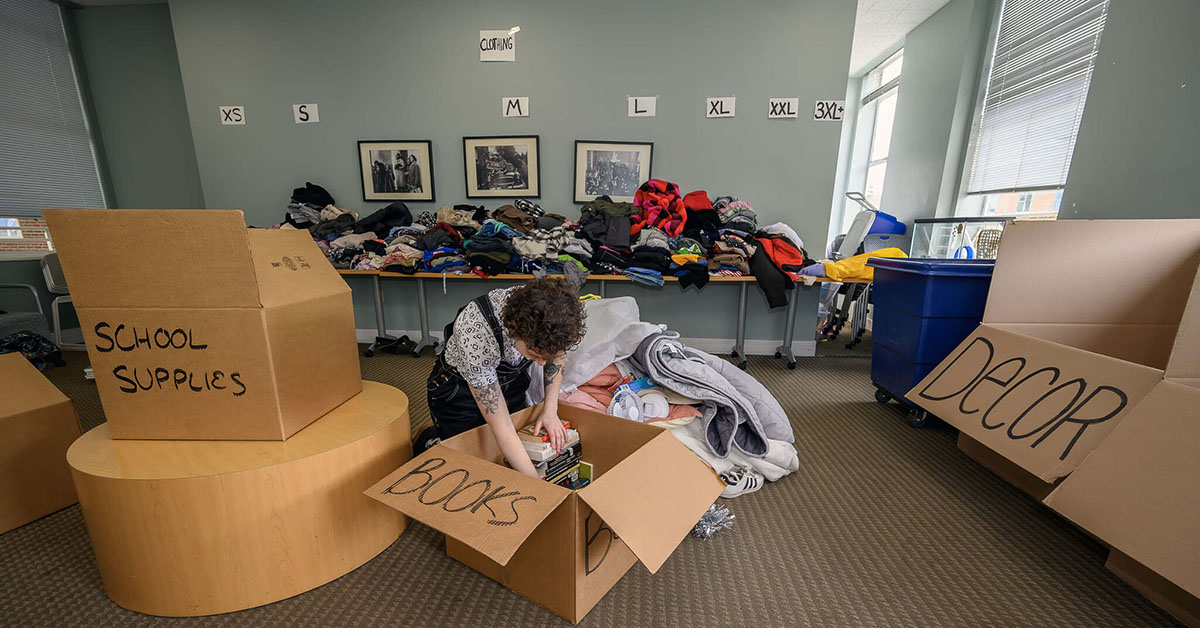Whea Give Back

Wheaton collects and repurposes over 1,500 pre-owned items during student move-out
At the end of each academic year, when college students vacate their residence halls in May, hundreds of pre-owned items are in need of new owners. To put these no-longer-loved objects to good use, Wheaton College’s Residential Life office and the Center for Social Justice and Community Impact organized the Whea Give Back program.
As students cleaned out their rooms over the course of two weeks, they donated more than 1,500 individual articles they did not wish to keep to Whea Give Back, which collected the goods to reuse and upcycle.
Donation bins were placed in each residence hall or theme house, and volunteers emptied the bins regularly and brought the contents to the Balfour-Hood Campus Center’s 1960 Room. There, each article was cataloged, sorted and displayed to provide students with an opportunity to peruse the collection and take any items of interest.
Prior to the COVID-19 pandemic, for many years the college ran a similar collection process at the end of the academic year, then held a yard sale for Wheaton and the local community in Clark Recreation Center.
“Coming out of the pandemic, we wanted to run another program because there is a significant need to mitigate the amount of waste created during the move-out process,” said Tim Jordan, assistant dean of Residential Life. To reimagine this year’s effort, Jordan collaborated with Leonard Breton, director of social justice and community impact, and Winnie Collins, administrative associate in the Center for Social Justice and Community Impact.
“Items that students no longer want can be used by other students or the goods are donated to charity organizations,” Jordan said.

Wheaton collaborated with area agencies to repurpose its collection. Over 500 pounds of textiles (clothes/shoes/bedding) and more than 400 pounds of miscellaneous household items were donated to the Epilepsy Foundation.
“We truly appreciate this donation and the ways it helps us help people living with epilepsy,” said Gail Biancucci, sales director of the Epilepsy Foundation New England Donation Center. “It is such a win-win when students have the convenience of donating and recycling right on campus. The programs we run are made possible by colleges, organizations and people in our community donating their unwanted clothes and goods to the Epilepsy Foundation and we are so grateful.”
In addition to those materials, four boxes of food were given to the Wheaton Food Pantry and two boxes of paperback books were provided to the Providence Books Through Bars program, which distributes free reading material to incarcerated people nationwide.
“We had our first book drive two years ago and collected over 100 books,” said Beard and Weil Galleries Director Elizabeth Hoy, who led the book collection effort with assistance from her team of student gallery employees. “Providence Books Through Bars is a very small nonprofit doing really important work.”

A team of 61 dedicated students and staff volunteered to support the Whea Give Back program, and were critical to its success, according to Jordan.
“Being part of Whea Give Back is about actively participating in a community-driven initiative that promotes sustainability and social responsibility,” said program volunteer Amy Saad ’25.
“By donating items, volunteering time and using resources, it helps students not only reduce waste but also contribute to a giving and sharing community. … By encouraging the reuse of belongings, we’re limiting the amount of waste and providing opportunities for those in need to access essential items at no cost,” said Saad.
Another volunteer, Birashree Shah ’25, strongly believes in helping her community.
“By establishing this system … we are ensuring that reusable items are given another chance. Through Whea Give Back, our community can significantly reduce the amount of waste that we produce. It is a small step against the massive climate crisis, but it is a step in the right direction,” Shah said.
Emma Arcaro ’25 has helped coordinate smaller scale programs to support the community in the past. She is a residential advisor for the Living Learning Community (LLC) on campus that teaches students about serving others through social justice and community involvement programs.
“This is what I do. It’s my mission and my passion,” she said. “In December, I organized a drive for the food pantry. … We need to be able to do stuff like this because communities give to you, and you need to be able to reciprocate.”
